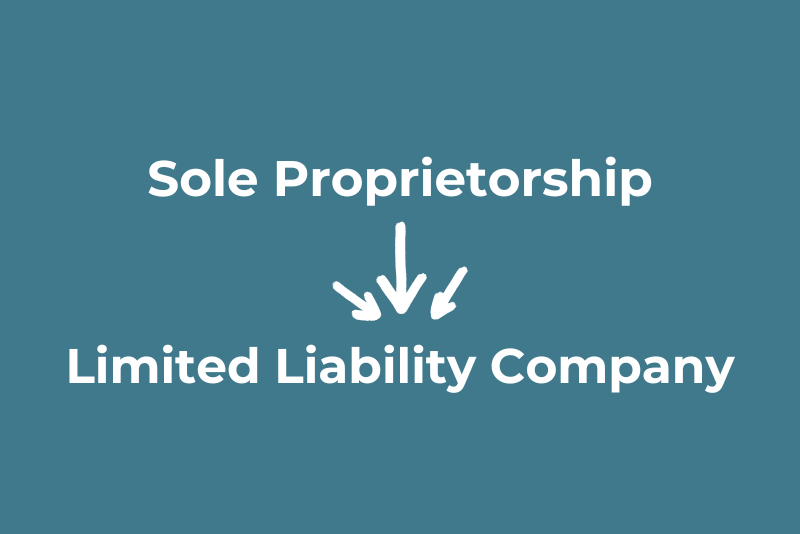If you’re wondering if you’re able to change your Sole Proprietorship to a Limited Liability Company, the answer is a resounding yes. And I’ll go a step further and tell you that not only can you change your Sole Proprietorship to an LLC, but that you probably should change it.
Changing your Sole Proprietorship to an LLC, which means the business would be recognized by the state and operate under a legal structure, isn’t a particularly difficult task, but it needs to be done carefully and in accordance with the rules of your state. Not taking the proper steps and fulfilling state requirements could result in your application not being approved and your business plans delayed.
In this article I’ll explain what you need to do to convert a Sole Proprietorship to an LLC, but first let’s have a look at some of the reasons why it’s a good idea to do so.
Reasons to Convert a Sole Proprietorship to an LLC
There are a lot of good reasons to change your business from a Sole Proprietorship to an LLC, the most important of which is personal liability.
When you have a Sole Proprietorship, you are the business. There’s no legal or financial separation between you and it. As the business owner, you’re responsible for all expenses and debt.
That means if a bank loan comes due or you get a big bill from a vendor that you can’t pay, you are personally responsible for meeting that obligation. If someone files a claim or lawsuit against your business, you’re responsible for that, too. A court could seize your personal assets—including your house, bank accounts, investments, and vehicles—to cover the business debts, wiping out the benefits of years of hard work. An LLC, on the other hand, is its own legal entity, independent of its owners. In the event of a lawsuit or large business debt, only the assets of the business are in play and your personal property is protected.
Personal liability might be the biggest reason to change your Sole Proprietorship to an LLC, but it’s not the only one. A Sole Proprietor, as you know, reports income and expenses on their annual taxes using Form 1040, Schedule C, and pays taxes based on their personal income rate. By default, an LLC is taxed the same way. And members who work in the LLC are considered self-employed, meaning that in addition to income tax they must pay the combined employee and employer amounts of Social Security and Medicare taxes, which in 2024 is a hefty 15.35.
A benefit of an LLC, however, is the option to have the business classified as a Corporation for tax purposes, instead of the default method of being taxed as a Sole Proprietorship. Doing so can result in tax advantages without affecting the LLC’s legal status.
You and any other LLC members would be paid as employees and participate in company benefit programs, which may result in paying less taxes. You’d also avoid paying both the employee and employer amounts of Social Security and Medicare taxes.
There are downsides to being taxed as a Corporation, of course, the most noteworthy being that you may be taxed twice, once on the net earnings of the business and again on the distributions you receive. Converting from a Sole Proprietorship to an LLC doesn’t mean you won’t have to pay taxes, but it enables you to decide how you want to incur them.
Another important reason to consider changing the type of business entity you have is that it could make it much easier to raise capital. Many investors won’t provide backing to a business that is not registered with the state and operating under some sort of legal structure. And while a Sole Proprietor can’t sell shares to raise capital or attract investors, members of an LLC can sell ownership stakes to raise equity capital to help grow the business.
Changing your business structure from a Sole Proprietorship to an LLC also increases the company’s growth opportunities; enables you to bring on partners; and makes it easier to sell the business, should you desire to do so.
Register Your LLC With CorpNet
Whether you’re forming a new LLC or converting an existing business to an LLC, we can handle all the paperwork for you.
How to Convert Your Business to an LLC
- Confirm the business name you want is available. If another business that’s already registered with the state is using the name you want, it is entitled to continue using it and you’ll need a new one. You can conduct a business name search on the website of the Office of the Secretary of State or the corresponding office in your state. Remember that you also should search the United States Patent and Trademark Office to make sure the name you choose isn’t trademarked or in violation of any trademark laws.
- Create and file articles of organization with the state where your business is based. Articles of organization are a public document that contains basic information pertaining to your business, including the name of your registered agent, which is a person or company designed to receive legal correspondence on behalf of the LLC. Once filed, articles of organization are kept on record with your state and must be kept updated.
- Get an operating agreement drawn up and put into place. While operating agreements aren’t legally required for LLCs by most states, they are extremely important in protecting your business and making sure it operates smoothly. An operating agreement lays out the terms of how the business will operate based on the needs and wishes of its members. It demonstrates the LLC is a separate entity that follows rules and operates as specified in the document. If you’re ever facing a lawsuit or large liability, having an operating agreement in place can reinforce your limited liability status and assure your personal and business assets remain separate—the very reason you formed the LLC in the first place. An operating agreement is important for every LLC, regardless of how many members it has.
- File a Form SS-4 to get an employer identification number (EIN). An EIN is a nine-digit federal tax ID the IRS assigns to businesses for tax filing and reporting purposes. If you had an EIN for your Sole Proprietorship, which is not required, you’ll need to get a new one for your LLC. If you are the only member of your LLC and don’t plan to elect to be considered a Corporation for tax purposes, however, you are considered a disregarded entity by the IRS and can choose to use your Social Security number for tax purposes instead of getting an EIN.
- Open a business bank account. Even if your LLC has only one member and is treated as a disregarded entity by the IRS, you’ll need to keep your personal and business assets separate by opening a business bank account. As with having an operating agreement in place, this is an important step in reinforcing your LLC’s limited liability status and must not be overlooked.
- Obtain required business licenses and permits. Depending on your industry and state, county, and local laws, you may have to apply for business licenses and permits. You’ll need to research which types of licenses and permits are required for your business.
Making Sure Your LLC Remains in Compliance
Once you’ve changed your Sole Proprietorship to an LLC, you are responsible for complying with all applicable rules and regulations. Doing so keeps your business in good standing with the state, which issues a Certificate of Good Standing or equivalent document.
What is necessary to keep your business in good standing varies from state to state. You’ll probably have to file an annual report and pay a yearly fee, and renew business licenses and permits, as required. You’ll have to pay your taxes, of course, file articles of amendment if you change the name of your company or make other changes, and keep your Beneficial Ownership Information report updated.
Keeping up with everything that’s necessary to remain in good standing can be a cumbersome task, but it’s extremely important as not doing so can result in consequences ranging from fines and penalties to administrative dissolution or termination of the business by the state.
A Few Last Thoughts
There are a lot of reasons why Sole Proprietorships are the most popular business structure in the United States, including the ease of getting them set up and operating, the streamlined method of taxation, and minimal compliance costs.
I’d argue, however, that the disadvantages and risks associated with Sole Proprietorships outweigh the benefits. No business owner wants to be faced with a situation that puts their personal assets at risk, and that’s unavoidable with a Sole Proprietorship.
If you’re considering changing your business to an LLC, I’d urge you to do your homework and consider your options carefully. If you’re unsure of how to proceed, seek the advice of qualified legal and tax professionals.





